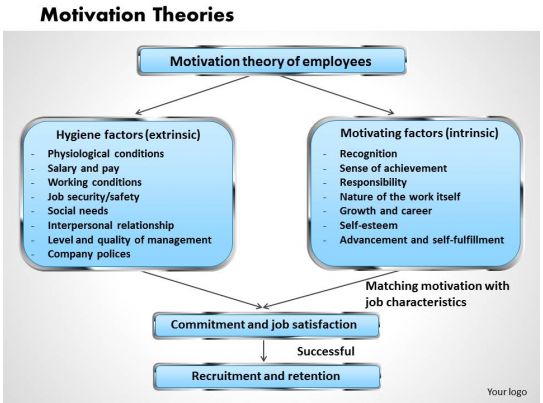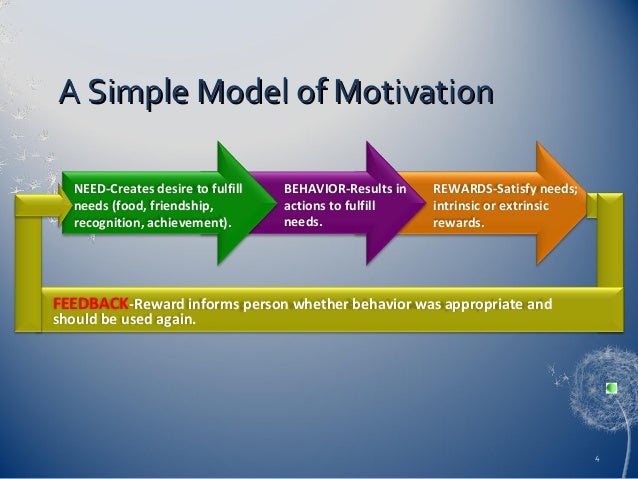2 Factor Theory Of Motivation
What is the Herzberg Two Factor Theory of Motivation

Herzberg s Motivation Theory model or Two Factor Theory argues that there are two factors What is Two Factor Theory Herzberg s Theory of Motivation tries to get to the root of motivation in the workplace. You can leverage this theory to help you get the best performance from your team.The two-factor theory also known as Herzberg s motivation-hygiene theory and dual-factor theory states that there are certain factors in the workplace that cause job satisfaction while a separate set of factors cause dissatisfaction all of which act independently of each other.The Herzberg Two Factor Theory is a theory about motivation of employees. This theory assumes on the one hand that employees can be dissatisfied with their jobs. This often has something to do with so-called hygiene factors such as salary and work conditions.This is a theory of Herzberg s theory that are two-factor theory also known as Herzberg s motivation-hygiene theory and dual -factor theory states that there are certain factors in the workplace that cause job satisfaction while a separate set of factors cause dissatisfaction all of whichMotivational factors- According to Herzberg the hygiene factors cannot be regarded as motivators. The two factor theory is not free from bias as it is based on the natural reaction of employees when they are enquired the sources of satisfaction and dissatisfaction at work.Herzberg s two factors theory on work motivation does its. Work for todays environment employees performance or productivity Motivation factors must be addressed. Two-Factor Theory is closely related to Maslow s hierarchy of needs but it introduced more factorsThe core point of Herzberg s Two Factor Theory of Motivation is that motivating and hygiene factors are very different. Hygiene factors are essential in helping individuals to stop being dissatisfied at work. But crucially no matter how great these factors are they alone will never help an individualMotivation-Hygiene Theory. Herzberg s findings revealed that certain characteristics of a job are consistently related to job satisfaction while different factors are Another common criticism is the fact that the theory assumes a strong correlation between job satisfaction and productivity.Herzberg s Two Factor Theory is one of the motivation theories and it suitably complements for example Maslow s pyramid. Herzberg named two basic factors which are an employee s source of satisfaction and motivation - hygiene factors and motivators.Herzberg s Two-Factor theory of motivation at work is introduced in this revision video. alevelbusiness aqabusiness edexcelbusiness.
Herzberg s two-factor theory of motivation is based on two types of factors. These factors are satisfiers motivational and dissatisfy maintenance The second group or the job content factors are found to be the real motivators because they have the potential of yielding a sense of satisfaction.This theory also knew the Two Factor theory or the Motivation-Hygiene theory or the Dual factor theory was developed by Frederick Herzberg an American psychologist and behavioral scientist in 1959. This theory revolves around the proposition that two kinds of factors can be found in aHerzberg s two factor theory is one of the most well known theories of motivation. An extensive amount of research has been conducted based on this theory. He questioned people in this regard to know what caused pleasure and satisfaction. The result of his extensive research was the two factorHerzberg motivation theory attempts to answer the age old question of what do people get motivated by What do they want in their jobs and how to The Herzberg motivation theory is a simple yet powerful tool which still forms the bedrock of motivational practices today and is used to helpHerzberg s Two Factor Theory is a content theory of motivation Needs priority to a great extent characterizes the types of behavior. The idea of quite a few management personalities that money is the only motivation was changed by Herzberg s theory of motivation.Herzberg Two Factor Theory or Herzberg s Motivation-Hygiene Theory argues that there are two factors that influence the motivation of the employee in the organization. In 1959 Herzberg conducted a study on 200 engineers and accountants from over nine companies in the United States.Herzberg two-factor theory of motivation or explains how hygiene factors impact your project team s motivation. In this article you will learn about how to apply That was the hardest part in the Herzberg s two-factor theory. So now there are factors that contribute to growing job dissatisfaction.Two Factor Theory is based on two sides to motivation. Hygiene factors which are required but don t increase motivation and growth factors which are the crucial factors which actually drive motivation. Herzberg first discussed his influential theory in 1959 s Motivation to Work.What is Herzberg s theory and how does it relate to an understanding of motivation How can a manager use an understanding of Herzberg s theory to motivate employees Frederick Herzberg s studies indicated that certain job factors are consistently related to1. Herzberg two factor theory is beneficial to managers as it expounds on the issue of motivation. It creates a basis upon which transformations in the READ ALSO Trait theory of leadership. To fully benefit from this theory there is the need to eliminate the factors that cause dissatisfaction and
Herzberg two-factor theory of motivation Hygiene factors and Motivation factors. Absence of Hygiene factors causes dissatisfaction. What is interesting in Herzberg s theory is that Hygiene factors have no positive impact on work satisfaction.Herzberg s two factor theory is also called the motivation-hygiene theory of motivation. The theory is based on the information collected by These two - questions can be stated by the following two ways i. What are the factors or reasons for which a particular individual is satisfied in theHerzberg had close links with Maslow and believed in a two-factor theory of motivation . He argued that there were certain factors that a business could He argued that there were certain factors that a business could introduce that would directly motivate employees to work harder motivators .Herzberg s two-factor theory is a psychological theory on motivation in the workplace developed by psychologist Frederick Herzberg in the 1960s. Herzberg stated that the presence of motivators ensured employee satisfaction while job dissatisfaction arose from a lack of hygiene factors.two-factor theory theory of worker motivation formulated by Frederick Herzberg which holds that employee job satisfaction and job dissatisfaction are For example failure to receive recognition for good work recognition being categorized as a motivator was the principal cause of 18 of theThis article aims to review Herzberg s two-factor theory to employee motivation in today s enterprises. Herzberg s Theory of Motivation 1 I. Introduction People employees are to an organization the most valuable asset therefore management of people in the workplace is theTwo Factor Theory and Significance. Herzberg was the first to show that satisfaction and dissatisfaction at work nearly always arose For full details of the Herzberg study figures and to fully appreciate the complexity and subtlety of his findings see Herzberg s book The Motivation to Work.Herzberg s Two Factor Theory is a content theory of motivation the other main one is Maslow s Hierarchy of Needs . Salary and employee benefits continue to be the top driver among the Indian workforce across all profiles while choosing an employer in 2018 according to an employer brandingHerzberg s Motivation Theory model or Two Factor Theory provides two factors that affect motivation in the workplace. Two-factor theory theory of worker motivation formulated by Frederick Herzberg which holds that employee job satisfaction and job dissatisfaction are influencedAccording to the Two Factor Theory of Frederick Herzberg people are influenced by two factors. Satisfaction and psychological growth was a factor of Dissatisfaction was a result of hygiene factors. Herzberg developed this motivation theory during his investigation of 200 accountants and
Two Factor Theory
School of Business. Motivation -
Lecture Week 10 - What makes us different from one another
Lecture Week 10 - What makes us different from one another

School of Business. Motivation - online presentation

Motivation Theories Powerpoint Presentation Slide Template

Motivation

Terry Rosoman 6-P Hierarchy of Unbreakable Resilience
